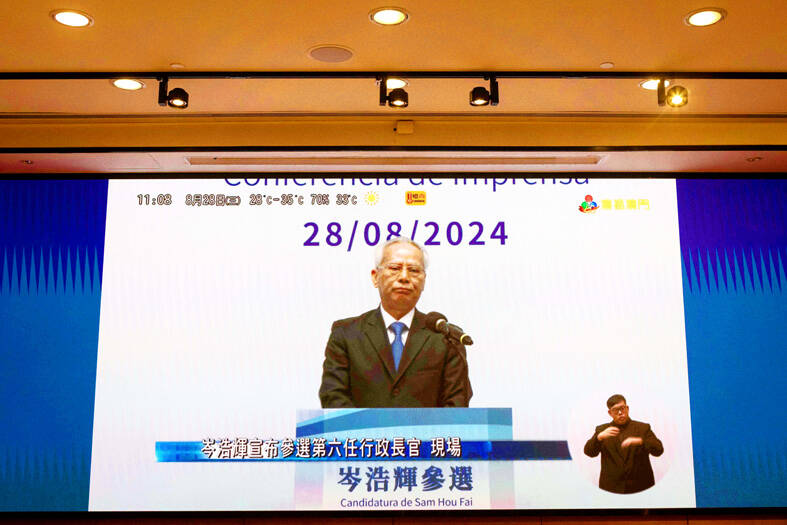Former Macanese Court of Final Appeal president Sam Hou-fai (岑浩輝) yesterday announced his bid to run in an October election for chief executive of the Chinese casino hub.
Macau, a special administrative region under China’s “one country, two systems” framework, is to hold an election on Oct. 13 in which only about 400 pro-establishment figures are allowed to vote.
Macanese Chief Executive Ho Iat Seng (賀一誠) last week announced his plans to step down in December, citing health concerns.

Photo: AFP
Sam, who had resigned from his position as president of Macau’s highest court the day before, yesterday in a news conference said that he has “decided to run for the office of the sixth chief executive of the Macau Special Administrative Region.”
No other candidates have declared a bid, and the nomination period runs from today to Sept. 12. Any new leader would need approval from Beijing.
If elected, 62-year-old Sam would become the first Macau leader with a legal background, in contrast to his three predecessors who all hailed from the business sector.
The territory’s fortunes have long been pegged to its booming casino industry, though Chinese President Xi Jinping (習近平) has urged Macau to diversify its economy.
Sam said Macau’s economic and political development faced “unavoidable” challenges, and that it needed to “reform and innovate.”
“Macau’s long-term development is only possible with the country’s support,” Sam said, stressing the need to serve China’s development blueprint.
Born in Zhongshan, China, in 1962, Sam would be the first leader not born in Macau if he is elected. He graduated from the elite law school of China’s Peking University and received further education in Portugal.
Sam was among the first batch of judges trained in Macanese Magistrates Training Center and was appointed the president of the Macanese Court of Final Appeal on the same day the territory was handed back to China on Dec. 20, 1999. Under Sam’s leadership, Macau’s apex court in 2021 outlawed the peaceful candlelight vigil held to commemorate the 1989 Tiananmen Square Massacre.

A feud has broken out between the top leaders of the far-right Alternative for Germany (AfD) party on whether to maintain close ties with Russia. The AfD leader Alice Weidel this week slammed planned visits to Russia by some party lawmakers, while coleader Tino Chrupalla voiced a defense of Russian President Vladimir Putin. The unusual split comes at a time when mainstream politicians have accused the anti-immigration AfD of acting as stooges for the Kremlin and even spying for Russia. The row has also erupted in a year in which the AfD is flying high, often polling above the record 20 percent it

Ecuadorans are today to vote on whether to allow the return of foreign military bases and the drafting of a new constitution that could give the country’s president more power. Voters are to decide on the presence of foreign military bases, which have been banned on Ecuadoran soil since 2008. A “yes” vote would likely bring the return of the US military to the Manta air base on the Pacific coast — once a hub for US anti-drug operations. Other questions concern ending public funding for political parties, reducing the number of lawmakers and creating an elected body that would

The latest batch from convicted sex offender Jeffrey Epstein’s e-mails illustrates the extraordinary scope of his contacts with powerful people, ranging from a top Trump adviser to Britain’s ex-prince Andrew. The US House of Representatives is expected to vote this week on trying to force release of evidence gathered on Epstein by law enforcement over the years — including the identities of the men suspected of participating in his alleged sex trafficking ring. However, a slew of e-mails released this week have already opened new windows to the extent of Epstein’s network. These include multiple references to US President Donald

CHARGES: The former president, who maintains his innocence, was sentenced to 27 years and three months in prison for a failed coup bid, as well as an assassination plot Far-right former Brazilian president Jair Bolsonaro is running out of options to avoid prison, after judges on Friday rejected his appeal against a 27-year sentence for a botched coup bid. Bolsonaro lost the 2022 elections and was convicted in September for his efforts to prevent Brazlian President Luiz Inacio Lula da Silva from taking power after the polls. Prosecutors said the scheme — which included plans to assassinate Lula and a top Brazilian Supreme Court judge — failed only due to a lack of support from military top brass. A panel of Supreme Court judges weighing Bolsonaro’s appeal all voted to uphold